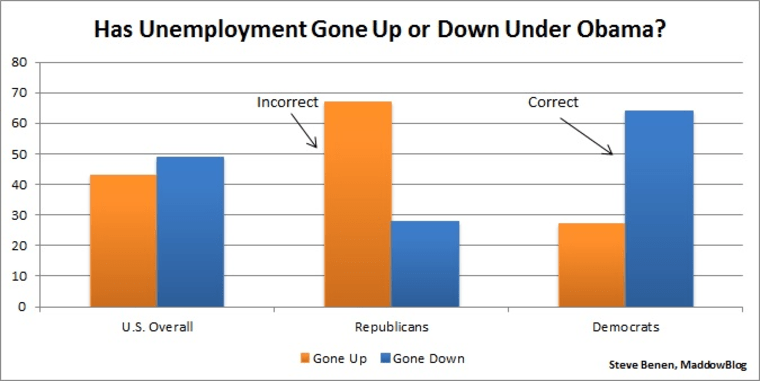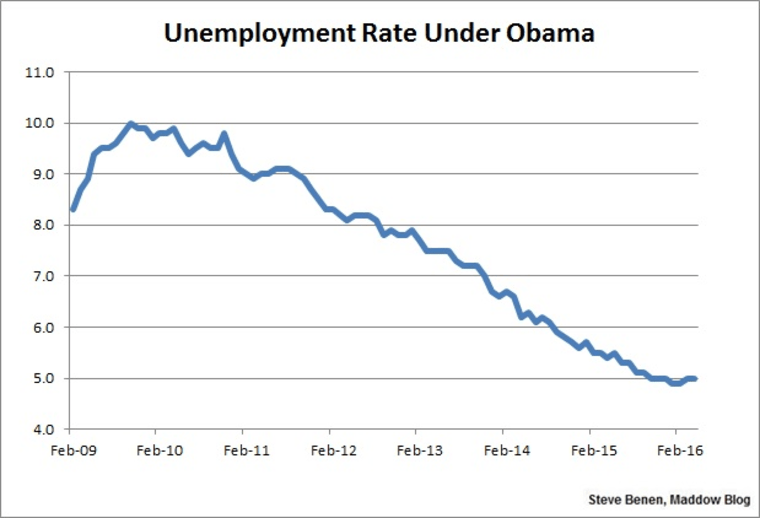
There continues to be a lot of misinformation about what has happened during Obama's time in office. 43% of voters think the unemployment rate has increased while Obama has been President, to only 49% who correctly recognize that it has decreased. And 32% of voters think the stock market has gone down during the Obama administration, to only 52% who correctly recognize that it has gone up. In both cases Democrats and independents are correct in their understanding of how things have changed since Obama became President, but Republicans claim by a 64/27 spread that unemployment has increased and by a 57/27 spread that the stock market has gone down.
"It's a fact that unemployment has gone down and the stock market has gone up during the Obama administration," said Dean Debnam, President of Public Policy Polling. "But GOP voters treat these things more as issues of opinion than issues of fact."
And that's not a positive development. As we discussed around Thanksgiving, in any democratic political system, partisans are supposed to disagree. Officials and candidates are supposed to fight and argue, denounce their rivals' ideas, and make the case to voters that they know what they're talking about.
But what's often exasperating about contemporary American politics is the degree to which partisans live in alternate realities. It's one thing to disagree on the merits of ideas; it's something else to disagree on whether objective, quantifiable truths are real.
The data from Public Policy Polling offers a great example. Respondents were asked, "Do you think the unemployment rate has increased or decreased since Barack Obama became president?" By more than a two-to-one margin, Republicans said the jobless rate has gone up. For Democrats, the results were a mirror image in the other direction.
Whether or not the unemployment rate has improved is not a matter of opinion. No matter how one sees the world, the Obama era started with 7.8% rate; it climbed to 10%, and has since fallen to 5%. One need not be a mathematician to know that 7.8% is larger than 5%.
Here, for example, is the unemployment rate since President Obama took office.

But most Republican voters don't believe it. The reality gap stands in the way.
The same PPP poll asked respondents whether the stock market has gone up or down in the Obama era. Again, Republicans said Wall Street has tanked while Democrats said it soared.
But the facts are not in dispute: on the day President Obama was inaugurated, the market closed at 7,949.09. As I type, it's about 17,660.
As regular readers know, if GOP voters want to make the case that Obama's policies don't deserve credit, fine. If they want to argue that there are other, more important metrics than unemployment and the stock market, no problem. If they want to suggest things would be even better if the country had adopted a right-wing agenda, we can at least have the conversation.
But the polling suggests Republicans prefer to pretend reality just isn't true. It's as if a form of cognitive dissonance is kicking in: the president is bad, falling unemployment is good, ergo unemployment must be higher, not lower.
As we talked about the last time a poll like this was released, this is by no means limited to unemployment and Wall Street. President Obama increased border security, and Republicans are absolutely certain that he's done the opposite. The deficit has dropped by $1 trillion in the Obama era, and Republicans just know in their gut that the deficit has ballooned.
The Affordable Care Act has lowered the uninsured rate to unprecedented depths, but Republicans are confident that "Obamacare" hasn't improved the uninsured rate at all. The United States' international reputation has improved dramatically since the end of the Bush/Cheney era, though Republicans believe it's deteriorated.
Maybe the bubble of conservative media has shielded many Republican voters from details the party's voters don't want to hear. Maybe Republican voters have a tribal reflex that gets in the way.
Whatever the cause, this reality gap is a frustrating drag on the public discourse. If those engaged in the public debate have no shared reality, then there's no common foundation to build upon, and even less to talk about.